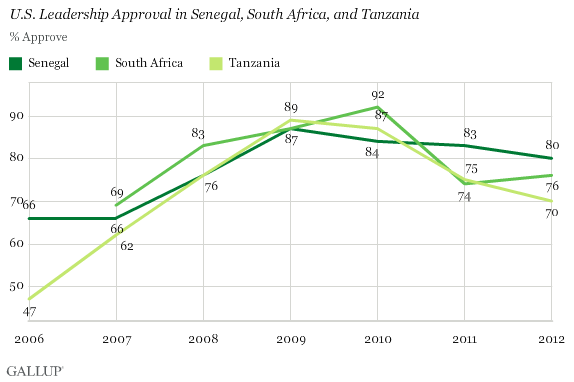WASHINGTON, D.C. -- As President Barack Obama seeks to engage the African continent with a weeklong trip to Senegal, South Africa, and Tanzania, he will face residents who have lost some faith in U.S. leadership. Residents in all three countries remain less enthused with U.S. leadership than they were in 2009 and 2010, during the first two years Obama was in office. In Senegal, Obama's first stop, approval of U.S. leadership was at 80% in 2012, down from 2009, when it had shot up to 87%.

About three-fourths of South Africans (76%) approved of U.S. leadership in 2012, much lower than the high of 92% seen in 2010. Tanzanians are the least approving among residents of the three nations, with approval dropping to 70% last year from a high of 89% in 2009. However, Tanzanians' approval level is still higher than it was during George W. Bush's administration when in 2007, 62% approved of U.S. leadership, and in 2006, 47% approved.
The trend in approval ratings in Senegal, South Africa, and Tanzania is in line with what Gallup finds throughout the region. The median U.S. leadership approval rating among populations in sub-Saharan Africa fell to 70% in 2012, from 74% in 2011, and from a high of 85% in 2009. It is now about where it was in 2008, and a bit better than the 62% median approval in 2007.
Among all global regions, though, approval of U.S. leadership remains among the highest in Africa. Whether it stays that way though may rely heavily on whether President Obama makes a strong and lasting impression during his trip -- and follows it up with increased engagement in the region on the issues its leaders and residents care most about.
For complete data sets or custom research from the more than 150 countries Gallup continually surveys, please contact us.
Survey Methods
Results are based on face-to-face interviews with 1,000 adults, aged 15 and older, conducted in Senegal in March 2012 and in Tanzania in June 2012 and with 2,000 adults, aged 15 and older, in South Africa in March 2012 and November 2012. Gallup surveyed 1,000 respondents in each country in prior years.
The margin of error ranges from ±2 percentage points to ±6.5 percentage points. The margin of error reflects the influence of data weighting. In addition to sampling error, question wording and practical difficulties in conducting surveys can introduce error or bias into the findings of public opinion polls.
For more complete methodology and specific survey dates, please review Gallup's Country Data Set details.
